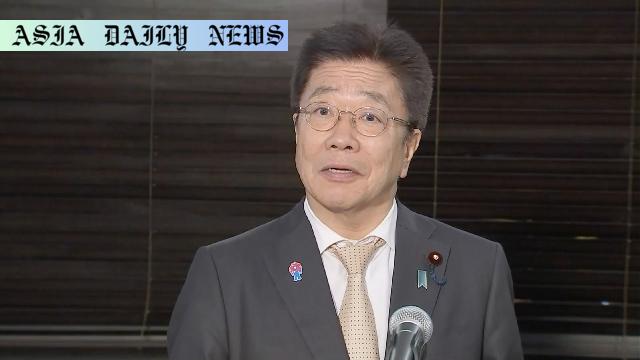US Treasury bonds – Japan considers its massive US bond holdings as a potential negotiation tool in US tariff discussions.
- Japan’s Finance Minister flags US Treasury bonds in trade talks.
- Japan is the largest foreign holder of US Treasuries at $1.08 trillion.
- Finance Minister Kato highlights Treasury bonds’ impact on negotiations.
- US-China-Japan dynamic influences global bond and trade policy.

Japan Leveraging US Treasury Bonds as a Negotiation Tool
Japan’s Finance Minister Katsunobu Kato has put the spotlight on a potentially game-changing move in international trade discussions with the United States: its substantial holdings of US Treasury bonds. In a television interview, Kato revealed that these financial assets, valued at approximately $1.08 trillion as of January 2025, could act as a strategic lever in Japan’s negotiations over tariff policies with Washington. This assertion highlights the complex interplay of economics and diplomacy, where fiscal instruments like government-debt securities can become bargaining chips.
Japan’s position as the largest foreign holder of US Treasury bonds affords it considerable influence. These bonds serve multiple purposes, not only as instruments of financial liquidity but also as potential tools to navigate economic uncertainties and manage market instabilities. It is noteworthy that Kato underlined the ownership of these bonds as a precaution, ensuring liquidity in moments of economic volatility. However, the mere suggestion of utilizing them as a negotiation tactic underscores the evolving nature of economic diplomacy in a globalized world.
Exploring the Global Impact of Treasury Bond Holdings
The significance of Japan’s US Treasury bond holdings cannot be understated, especially in the context of a competitive global economy. With China as the second-largest foreign holder of these bonds at $760 billion and the UK following with $740 billion, the financial dynamics between these nations underpin broader geopolitical strategies. The suggestion by Kato that Japan’s bond holdings might be used in negotiations is as much a signal to allies and trade partners as it is to the United States.
This stance also comes at a critical time when global markets are volatile. The relationship between a country’s financial instruments and its political strategies showcases the intertwining pathways of economics and international relations. The current status of the US-China-Japan trilateral relations provides additional layers of complexity, influencing not just market stability but also perceptions of trust among trading partners. For Japan, leveraging this economic strength reflects a calculated risk, balancing between protecting market interests and achieving political negotiation goals.
A Historical Perspective on Treasury Bonds and Trade Relationships
Japan’s strategy is not without historical precedent, as past trade negotiations have often involved leveraging financial dependencies. The importance of US Treasury bonds as a major asset class ties directly into global perceptions of economic stability. While Kato stopped short of committing to the actual use of these bonds in negotiations, his comments underscore the importance of these assets in international financial relationships.
Historically, large foreign investors in US Treasuries—such as Japan and China—have maintained these holdings to ensure liquidity and safeguard against market turbulence. In the same light, Kato’s remarks highlight a strategic shift where these bonds are viewed not just as financial assets but also as instruments of policy and diplomacy. By stating that all cards will be on the table, Kato emphasizes the evolving strategies nations employ to protect economic interests in a highly interconnected financial landscape.



Commentary
Economic Diplomacy: Japan’s Calculated Move
The decision by Japan’s Finance Minister to consider US Treasury bonds as a potential bargaining chip in tariff negotiations with Washington illustrates a sophisticated approach to economic diplomacy. The ability to wield financial assets in trade negotiations shows how interconnected global markets have become, where monetary tools can influence policy more effectively than traditional political maneuvers.
Japan’s $1.08 trillion in US Treasury bonds represents not only an investment but also a symbol of trust in the American financial system. The suggestion that these bonds could be leveraged as a tool adds an air of complexity to ongoing tariff talks, signifying that Japan is ready to employ its cards on the negotiation table. Such a move also highlights the growing role of financial assets within geopolitical strategies, a trend that other large economies such as China may emulate.
The Balance Between Strategy and Stability
What makes this development intriguing is the inherent tension between strategy and global market stability. The very idea of selling, or even signaling the intent to sell, a portion of US Treasury bonds can send ripples through global financial markets. For Japan, this is a double-edged sword; while it demonstrates bargaining power, any drastic action could also impact Japan’s own economic interests linked to US Treasury yields and the dollar’s value.
Ultimately, the careful balancing act displayed by Japan reflects how nuanced modern trade negotiations have become, combining economic leverage with broader geopolitical considerations. Kato’s reserved tone—emphasizing the importance of retaining these bonds for liquidity—demonstrates an awareness of the far-reaching effects such a strategy could have, not just for Japan and the US but for global financial markets.